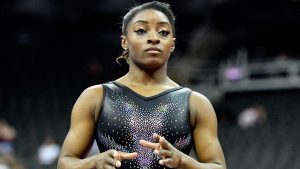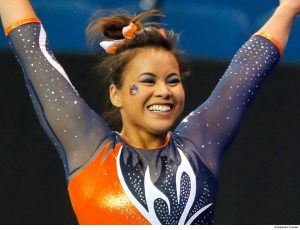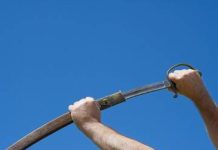When four-time Olympic gold medalist Simone Biles pulled out of the vaulting final of the Tokyo Games, she sent a signal to the entire world: mental health is a serious issue for elite athletes. As Biles stated to Hoda Kotb on NBC’s “TODAY” show, “Physically, I feel good. I’m in shape. Emotionally, it varies on the time and moment. Coming to the Olympics and being head star isn’t an easy feat.”

Psychologists and mental health professionals are becoming increasingly aware of the inordinate stresses and strains athletes endure, especially when they are expected to perform at an elite or professional level. Part of this dynamic is the unrealistic expectations around how those around these athletes deal with physical injuries versus emotional or psychological struggles.
As Emma Vickers, a Ph.D. Sport Psychology student points out, “When an athlete experiences physical injury, there is often a team of medical personnel including doctors, trainers and physiotherapists employed to ensure a speedy recovery. However, when an athlete experiences a mental health issue, the treatment process is often not quite as similar. Mental illness in sport is often overlooked and an athlete may be left with feelings of loneliness and abandonment, unsure of where to turn.”
This highlights an important point about elite athletes and mental health, which is that whether or not they thrive or struggle is largely a function of their broader sociocultural context. In a recent article in Sports Medicine, Dr. Cindy Chang, MD, Professor of Sports Medicine at University of California San Francisco, frames it this way in a recent article: “There is an interactive relationship between athlete personality characteristics and the athletic culture that may have both positive and negative effects on the individual athlete as well as the team or sport environment.”
A key aspect of this cultural component is the spoken and unspoken rules and ideas around perhaps the greatest threat to any athlete: a significant injury. Biles herself is keenly aware of her fear regarding injury, arguing, “We’re not just athletes. We’re people at the end of the day and sometimes you just have to step back. I didn’t want to go out and do something stupid and get hurt. I feel like a lot of athletes speaking up has really helped. It’s so big, it’s the Olympic Games. At the end of the day, we don’t want to be carried out of there on a stretcher.”
Dr. Margot Putukian of the Department of Athletic Medicine, University Health Services, Princeton University, puts it this way: “The psychological response to injury can trigger and/or unmask mental health issues including depression and suicidal ideation, anxiety, disordered eating, and substance use/abuse. There are barriers to mental health treatment in athletes. They often consider seeking help as a sign of weakness, feeling that they should be able to ‘push through’ psychological obstacles as they do physical ones.”
There is somewhat of a vicious cycle involved here. The fear of an injury can cause extraordinary stress, which in turn causes maladaptive behaviors, such as avoiding getting help or some type of counseling, in addition to negative physiological stress response, such as tense muscles, poor sleep, and impaired concentration. All of these factors make it more likely for an athlete to incur a serious injury.
And even when athletes are able to fully rehabilitate their bodies, their emotional ties to injuries play a crucial factor. A recent consensus statement by a panel of sports medicine experts concluded that “ Emotional reactions, including a lack of confidence, apprehension and fear, may accompany an athlete’s return-to-play. These reactions may become problematic, interfere with performance and increase the probability of re-injury.”
From this perspective, how others respond can either amplify the tendency because of unrealistic expectations or ameliorate them with appropriate support.
And teammates, as well as coaches, may play the most important roles in this cultural context. A 2018 study by Anne Marte Pensgaard in the Department of Coaching and Psychology, Norwegian School of Sport Sciences, found that “Players who report teammates as a source of stress have a greater risk of sustaining an acute injury, while players reporting the coach as a source of stress are at greater risk of sustaining an overuse injury.”
This psychosocial context cannot be underestimated, because even athletes who perform individual sports events are part of a larger fabric or system, be it a team, a school, or even a family system. In the article, The psychosocial aspects of a return to sport following serious injury: A review of the literature, the authors found evidence for this sociocultural perspective, stating:
Other factors such as sociodemographic, biological, psychological and social/contextual variables may play an equally important role in an athlete’s course of recovery and ability to return to full activity (Andersen, 2001).
If for instance, the athlete has received effective social support from the coach and teammates, has stayed involved with the team and has not been pressured to come back too early (i.e., social/contextual factors), then the athlete may feel more confident and supported in returning to play. Conversely, if the athlete has been isolated from the team and fears his/her position will be taken by another, the athlete may feel pressured and anxious about returning to play (Andersen, 2001).
The reality is career-ending injuries are more prevalent than most people would think, especially at the elite levels of Olympic stars, as well as college and professional sports. Most people are familiar with the injury rates for contact sports such as football or soccer, where concussions are common.
But women’s gymnastics has significant risk factors for injury, as well. Dr. David Geier an orthopedic surgeon and sports medicine specialist in Charleston, South Carolina writes that “Gymnastics has one of the highest injury rates of all girls’ sports. An estimated 425,900 children from ages 6-17 were treated in US hospital emergency departments for gymnastics-related injuries during a 16-year period from 1990–2005. Annually that averages 26,600 injuries in gymnastics.”
This became all too real when Auburn University senior Samantha Cerio, a gymnast, dislocated both knees and tore multiple ligaments in her legs during competition. Cerio is emblematic of the importance of a support system when facing athletes face such adversities and how mentally framing serious challenges helps athletes move on, stating “I mean, this is a small setback, but it’s …just another thing to get through. … Even though that was my last gymnastics meet, everything we do, everything I have done and trained for … has always been for my team. Just knowing that I have their support behind me.”

And even though Cerio will never compete again as a gymnast, she achieved her goals of graduating and walking down the aisle of her wedding and getting hired as an aerospace engineer at Boeing in Seattle.
The food news is that it appears Biles is in a positive mindset as well. Although her teammates initially panicked regarding her decision not to participate in Tuesday’s events, Biles remained calm and focused on the needs of her teammates, telling them, “You guys need to relax. You’re going to be fine without me. Go out there, you kick some butt just like you’ve done in training and just lay it out on the floor.”
Biles will participate in her scheduled Thursday events is hard to know. What isn’t difficult to know is how Biles has shown grace under pressure, and more importantly, that athletes should feel comfortable getting help for any mental issues before they become debilitating.
At Newsweed.com, we adhere to three simple principles: truth, balance, and relatability. Our articles, podcasts, and videos strive to present content in an accurate, fair, yet compelling and timely manner. We avoid pushing personal or ideological agendas because our only agenda is creating quality content for our audience, whom we are here to serve. That is why our motto is ”Rolling with the times, straining for the truth.”
Your opinion matters. Please share your thoughts in our survey so that Newsweed can better serve you.
Charles Bukowski, the Los Angeles beat poet that captured the depravity of American urban life once said, “There is something about writing poetry that brings a man close to the cliff’s edge.” Newsweed is proud to stand in solidarity and offer you a chance to get close to the cliff’s edge with our first Power of Poetry Contest. Are you a budding bard, a versatile versifier, a rhyming regaler? Do you march to the beat of iambic pentameter, or flow like a river with free verse? If so, here’s your opportunity to put your mad poetic chops to the test. Enter our poetry contest for bragging rights and an opportunity to win some cash!






